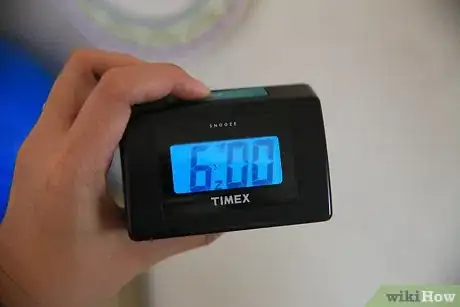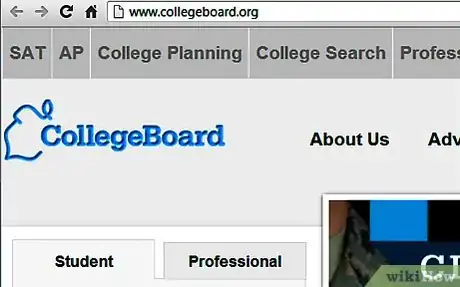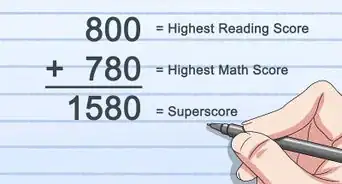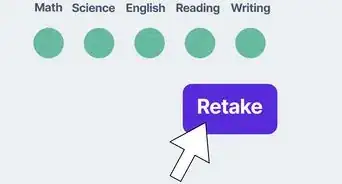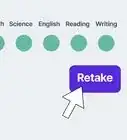This article was co-authored by Arash Fayz. Arash Fayz is the Co-Founder and Executive Director of LA Tutors 123, an academic consulting and private tutoring company based in Los Angeles, California. Arash has over 10 years of educational consulting experience, managing the tutoring of students of all ages, abilities, and backgrounds to score higher on standardized tests and gain admission to their target schools. He has a BA in Applied Mathematics and Computer Science from the University of California, Los Angeles.
There are 7 references cited in this article, which can be found at the bottom of the page.
This article has been viewed 165,004 times.
The SATs can be one of the most important tests you will ever take as a student. A strong SAT score is a great weapon in your arsenal when you're trying to get into a good college. And for that reason, the SAT can start to seem like an overwhelming and stressful task. The problem a lot of students have is that they don't have an organized plan for acing the test and instead either try to do too much or end up cramming at the last minute. But getting a perfect score does not have to be so daunting. By following this guide, you can come up with a workable plan to help you breeze through this test with confidence and clarity.
Steps
Self-Assessment
-
1Make a list of what you need to work on. Do you struggle with quadratic equations? Do you get stuck on grammar questions? Think about what you need to improve and set aside more time for it in your study plan. Not only will this help you on that particular subject, it will also help you feel less stressed overall.
-
2Don't forget your strengths. This may seem counter-intuitive, but while it's good to give attention to weak points, you don't want to lose sight of what you can do well. Devoting all your energy to that elusive perfect score in the writing section can make you forget some of those basic math skills you had under your belt. It's also important to remind yourself that you are an intelligent person with many strengths and beating yourself up over the hard stuff is only going to make you feel stressed-out and incompetent when it comes time to take the test.Advertisement
-
3Decide what kind of learner you are. Some people learn better when they read the problem, others do better when they listen to it. Some people need to visualize it in their heads. Think about how you learn information and apply it to your study program. If you learn best while listening, then listen to some lessons on CD while you drive. If you learn best by looking at the words, then go ahead and make packs of flashcards.
Planning Your Study Sessions
-
1Set aside thirty minutes to an hour every day for studying. The time for deep, focused studying is in the month (or months) before the exam, not on the night before. Studies show that studying for longer periods of time increase knowledge more than short cramming sessions.[1]
-
2Set goals for each study session. When we try to accomplish anything long-term, be it studying or exercising or writing a novel, it can be very easy to say, "Oh, this is too much, I'll do it tomorrow." The problem with putting things off is that finding the motivation to start them again becomes twice as hard. Give yourself a short, accessible goal for each session. For example, "I will get a 75% on this practice quiz," or "I will finish taking one practice test tonight."[2]
-
3Reward yourself. When you meet your goals, go ahead and treat yourself. Go get an ice cream cone. Play an hour of your favorite game. Go window shopping at a nearby store. This will keep your motivation high.[3]
Finding and Using Study Resources
-
1Use study books. The College Board, the official makers of the SAT have released The Official SAT Study Guide, which is a good starting point for your SAT resources. But there is also a plethora of study books out there for students to choose from. Your local and school libraries are likely to have a good selection so flip through them and see which appeal to you. But do not merely read the book cover to cover; actually do practice questions (preferably from official tests) and analyze the ones you've missed, or you will see little or no improvement.[4]
-
2Use the official SAT website. The College Board website (http://www.collegeboard.org) includes study tips, practice tests, a new SAT question of the day, and test day simulators. They also provide a feature to help you plan your own personal study guide, tailored to your needs.
-
3Find a good tutor. Private tutors can be a great resource, especially for students that don't know how to practice good study habits. There are many companies that offer private SAT tutoring, including The Princeton Review, Kaplan, and TestMasters. You can also ask your school guidance counselor which local tutoring service they recommend.[5]
-
4Use practice tests. There's a reason that books and websites keep offering practice tests. It's because there's no better way to find out what's going to be on your test. When you take a practice test, pretend it's the real test. Sit in a quiet space where there are no distractions and time yourself. Do not look ahead to the answers at the back of the book. At the end of the test, assess what you did right and wrong.
-
5Read magazine and newspaper articles. Practice reading long, comprehensive passages on a topic that will test your understanding. Try to stretch yourself by reading up on topics that you don't find interesting or don't know much about. Then have somebody test on you what you learned or write down a short analysis. This will force you to increase your attention span, analyze a topic, and practice close reading skills. However, if you are going to take the SAT in the near future, doing the reading comprehension section on the SAT would be a much wiser use of time.
-
6Play learning games. Studying doesn't always have to feel like a chore. Cool down at the end of a long session by playing a math or vocabulary game on your computer. This will not only help your skills but will also help you relax.
The Night Before the Test
-
1Do not study the night before the test. Take a night off. There is such thing as burnout. If you burn yourself out too much, you may get depressed, and begin to see major drops in your scores. Read a book, watch a movie. Go for a stroll around the block.
-
2Get a goodnight sleep before the test. Getting a good eight or nine hours of sleep is essential for feeling awake and healthy the next day.
The Morning of the Test
-
1Eat a hearty breakfast with plenty of fiber and protein. Oatmeal, yogurt, granola, and eggs are all good choices. Peanut butter is a good source of protein. Fresh fruit is a nice supplement and gives lot of natural sugar. Avoid processed sugars and refined carbohydrates like those found in doughnuts, muffins, and other pastries; those are likely to give you a brief energy surge and a deep "crash" later in the day.[6]
-
2Know exactly where your test center is and how long it takes to get there. The last thing you need is to be worrying about whether or not you'll be late for the exam. Have your destination planned out ahead of time so you can focus on staying calm and remembering your facts.
-
3Don't drink too much water or coffee. Unwanted bathroom breaks will take time away from your test so just drink enough to keep yourself hydrated.
Taking the Test
-
1Answer the easy questions first. Get the questions you know out of the way first so that you'll have more time to focus on the challenging ones.[7]
-
2Don't be afraid to skip questions. Sometimes you run into a particularly difficult question and before you know it, you've just spent fifteen minutes scratching out answers to that one problem. If a question is just beyond your ability to guess, then go ahead and skip it.[8]
-
3Always be aware of the time. Even while you're working on the test, be aware of the clock. Know how much time you have left and how many questions you have to do. This will help you avoid giving too much time to a particular section or problem.[9]
Expert Q&A
-
QuestionShould I eat before the SAT?
 Arash FayzArash Fayz is the Co-Founder and Executive Director of LA Tutors 123, an academic consulting and private tutoring company based in Los Angeles, California. Arash has over 10 years of educational consulting experience, managing the tutoring of students of all ages, abilities, and backgrounds to score higher on standardized tests and gain admission to their target schools. He has a BA in Applied Mathematics and Computer Science from the University of California, Los Angeles.
Arash FayzArash Fayz is the Co-Founder and Executive Director of LA Tutors 123, an academic consulting and private tutoring company based in Los Angeles, California. Arash has over 10 years of educational consulting experience, managing the tutoring of students of all ages, abilities, and backgrounds to score higher on standardized tests and gain admission to their target schools. He has a BA in Applied Mathematics and Computer Science from the University of California, Los Angeles.
Test Prep Tutor Yes! The SAT is about 4 hours long, so make sure to have a healthy breakfast so you can be productive and focused the day of the test.
Yes! The SAT is about 4 hours long, so make sure to have a healthy breakfast so you can be productive and focused the day of the test. -
QuestionOne of the tips says not to study on the night before the test. Does this mean not even a little refresher is advised?
 Community AnswerIt's okay to do a little refresher if this makes you feel better, but the important thing is that you try to relax and get plenty of sleep before the test, and don't rely on this last minute studying to have any meaningful effect on your performance.
Community AnswerIt's okay to do a little refresher if this makes you feel better, but the important thing is that you try to relax and get plenty of sleep before the test, and don't rely on this last minute studying to have any meaningful effect on your performance. -
QuestionHow can I identify my weaknesses and improve them when studying for the SAT?
 Community AnswerTake a few practice tests to spot your weak points, then focus on studying in those areas.
Community AnswerTake a few practice tests to spot your weak points, then focus on studying in those areas.
References
- ↑ https://blog.prepscholar.com/how-to-prepare-for-the-sat
- ↑ https://www.collegecovered.com/getting-into-college/applying/7-ways-to-prepare-for-the-sat-and-act/
- ↑ https://magoosh.com/hs/sat/2018/top-ten-ways-to-prepare-for-the-sat/
- ↑ https://www.princetonreview.com/college-advice/top-5-ways-to-prep-for-act-sat
- ↑ https://blog.collegevine.com/10-tips-to-prepare-for-the-sat/
- ↑ https://www.medicalnewstoday.com/articles/324044.php
- ↑ https://pennstatelearning.psu.edu/test-taking-tips
- ↑ https://pennstatelearning.psu.edu/test-taking-tips
- ↑ https://pennstatelearning.psu.edu/test-taking-tips
About This Article
To get a perfect score on the SAT, try to set aside 30 minutes to an hour every day for studying. It can help to focus on reading, writing, and math separately and follow up each study session with a section-specific practice test. Check out the official SAT website, which has tons of study tips, practice tests, and test day simulators that you can use to help you get ready for the big day. If you think you might benefit from a tutor, ask your school guidance counselor if they have any recommendations. For tips on setting goals for your study sessions, read on!



